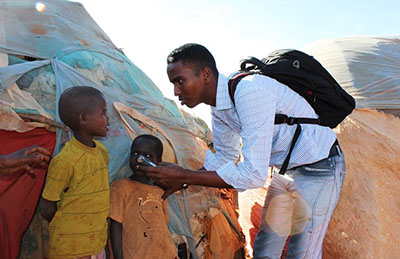My mother once sarcastically told me she could allow for my death, but couldn’t live with seeing my leg or hand amputated or with a lost eye after reporting from a battlefield. It was when she first learned that I had been secretly studying journalism in May 2005. The news made her distraught. She wanted me to go to school for medicine upon completing high school and become a doctor; my father wanted me to be a sheikh–an Islamic scholar. I wanted to be a journalist, but didn’t dare tell them.
“Being a journalist is like being a soldier, and that is a bit like a dead man walking. I don’t want such a career for you,” she told me in a soft voice an hour after I survived a huge explosion 10 yards from the speaker’s podium at Mogadishu’s largest football stadium in 2005. The country’s transitional Prime Minister Ali Mohamed Gedi, in his first trip to the capital since he had taken office in Nairobi, was speaking to large crowd of people there.
It was my first terrifying experience in the real world of journalism. More than 20 people died–most of them were standing around me just seconds earlier. Fire and smoke filled the stadium while blood and screams could be seen and heard all over the place. Panicked people were stepping over dead bodies and the injured, falling and pushing others out of the way to escape. Some were jumping over the walls. I was pushed over and stepped on several times, but managed to get up each time.
“Your mouth and your words are going to kill you. Drop it for good,” my mother told me. But I was just a fearless 17-year-old and an amateur journalist with big dreams of reaching the greatest of heights in global journalism. I couldn’t abandon such dreams easily.
Yet the death of a great Somali journalist and an award-winning Radio Ergo correspondent–and my friend–Yusuf Ahmed Abukar, better known as “Yusuf Keynan,” made me appreciate the warnings my mother gave me a decade ago. Keynan was also an editor of Mustaqbal Radio, one of the most influential stations in the capital. In the past four years, he was a roving correspondent based in Mogadishu for the humanitarian broadcaster Radio Ergo, where I work as a producer.
Just two days before he was killed, Keynan pitched to me an idea for a radio feature that investigated the root causes behind the country’s repeated droughts and famines. The feature reflected the fears voiced by aid agencies recently that Somalia is facing another catastrophic famine as witnessed in 2011. Nearly a quarter of a million pastoralists and farmers lost their lives in that famine. His pitch was interesting, so I approved the story. He was meant to brief me over his progress after the weekend.
“How is the city these days? Any new threats?” I asked him as we were about to end our conversation.
“[The people who threatened him] say they will come for me one day. I am still waiting for that day,” he replied.
That response didn’t shock me. Somalia is the most dangerous country in Africa to practice journalism and has one of the world’s worst impunity records in terms of journalist murders. Death threats, assassinations, and systemic violence are part of Somali journalists’ daily experience.
“Yes, we are all waiting that day,” I told him.
“Let’s hope it doesn’t come anytime soon,” he said. We laughed and called it a day.
But the day came sooner than either of us expected. On Saturday, June 21, 2014, a bomb planted under his car killed Yusuf Keynan, 27, in Mogadishu’s Hamarweyne neighbourhood. His second born child was only 20 days old.
Keynan was one of the brightest and most talented humanitarian correspondents working in the country. Upon hearing of his death, I immediately remembered our last conversation as if he were talking to me now. He told me he was a dead man walking. He knew that he would be killed sooner or later for nothing else but his journalistic career. Every journalist working in Somalia shares similar thoughts–morbidly waiting for their day to come–as a routine part of life.
But such risks do not induce us to give up the profession. Even though Keynan’s murder represents a huge loss for the local press, my colleagues’ resilience to inform the people about the country’s political and socioeconomic challenges at this critical stage will only grow. Every time we have suffered such tragedies, Somali journalists only come back more determined. The fight for truth continues because that is what all journalists who died for reporting the truth want us to do.
[Reporting from Nairobi, Kenya]
